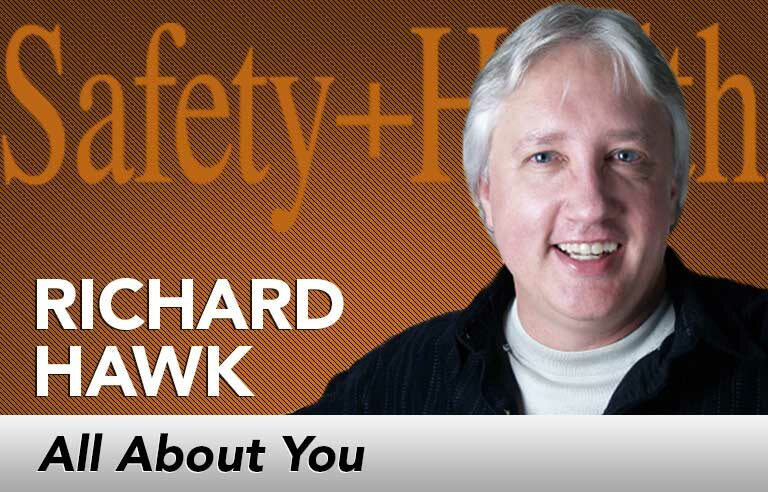All About You: Reward yourself

EDITOR’S NOTE: Motivating employees to work safely is part of the safety professional’s job. But who motivates the motivator? In this monthly column, veteran safety pro and professional speaker Richard Hawk offers his entertaining brand of wisdom to inspire safety pros to perform at their best.
My new fitness-tracking watch vibrates and sets off a display of fireworks when I reach 10,000 steps in a day. Last night, I took an extra walk around the block so I could get that electronic reward. I had already worked out earlier in the day, so I didn’t need the exercise, but I wanted to experience the fireworks.
Rewards feel good, even if they have no material value. Partly, it’s what they represent that makes them desirable. I know that when the algorithm in my watch tells it to vibrate and notify me of my success, no human emotions or consciousness are evoked. But I still like it because it’s telling me I’ve met a goal, and the recognition touches a need we all have – to be appreciated for our efforts.
You may not get the rewards and recognition you think you deserve at work or home, but you can always get as much of both as you want from yourself. You just need to take the time to dish them out. Rewarding yourself isn’t a selfish act, provided it’s not taken to extremes. Rather, it’s a proven way to help you stay motivated by giving yourself an emotional boost. Here are six ways you can reward yourself:
1. Change your routine. If I’ve had a productive week, I’ll sometimes take a drive to a nearby town to go to a coffee shop that I like. It takes some time out of my morning to get there, but it’s a pleasant change and a welcome reward. Is there some way you could change your routine and treat yourself after finishing a project or reaching a milestone? Perhaps you could go to a nearby park or museum.
2. Permit yourself to play. When I finish writing this article, I’m going to go play billiards. Although I occasionally go for my own enjoyment, this time it will be to reward myself – no guilt involved. I won’t be thinking, “I should be back at my computer starting another project.” Instead, I’ll be reveling in the fruits of my intellectual labor.
3. Purposely plan to play. Give yourself some time off when you reach a goal, whether for a few moments or by taking a weeklong vacation. Taking an afternoon off because you accomplished something also helps take away any guilt you might feel for not working.
4. Make a note of your success. This isn’t a reward in the classical sense, but it can create the same positive feeling a personal gift does. If it’s private, you can brag all you want in your journal and nobody will think you have an inflated ego. Although I describe my mistakes and failures in my journal, I make it a point to elaborate on my successes and tell myself what a great job I’ve done when I feel I’ve exceeded my expectations.
5. Bump up your rewards. No doubt, a few months from now the fireworks won’t thrill me as they do now. Perhaps I’ll do something special if I reach 10,000 steps for 10 days in a row. You should do the same when you’ve been rewarding yourself the same way for a while. Figure out some new way to increase the “prize” based on a bigger accomplishment.
6. Reward others. Giving rewards can feel even better than getting them. It doesn’t have to cost you anything besides your time and effort to show appreciation. Of course, if you do spend money on a present, it can increase its effect, but it’s not necessary. When I was a full-time safety professional, I used to send short, humorous “thank you” poems to employees or teams who had gone “above and beyond” with their safety behavior. The smiles, laughter and encouragement the poems elicited made me feel great. Of course, the recipients enjoyed them as well and felt their safety efforts were appreciated.
You don’t have to write poems. Any reward from you that is personal (meaning it could have only come from you) will have the same positive effect. Rewards – whether from a friend, colleague or vibrating watch – are always a pleasure.
This article represents the views of the author and should not be construed as a National Safety Council endorsement.
Richard Hawk helps companies around the world create more vibrant safety cultures by showing them how to make safety fun. As a professional speaker, author and musician, he also inspires employees to focus better and enlightens safety leaders about ways to increase their influence. To learn more about Richard, visit makesafetyfun.com.
Direct to your inbox: Sign up to be notified in email about new "All About You" columns.
Listen on Soundcloud or Stitcher
Post a comment to this article
Safety+Health welcomes comments that promote respectful dialogue. Please stay on topic. Comments that contain personal attacks, profanity or abusive language – or those aggressively promoting products or services – will be removed. We reserve the right to determine which comments violate our comment policy. (Anonymous comments are welcome; merely skip the “name” field in the comment box. An email address is required but will not be included with your comment.)

